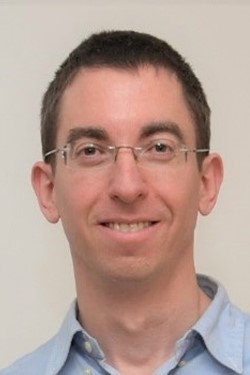Shai Carmi
2023 Israel Award Winner — Faculty

Current Position:
Associate Professor
Institution:
The Hebrew University of Jerusalem
Discipline:
Genetics & Genomics

Current Position:
Associate Professor
Institution:
The Hebrew University of Jerusalem
Discipline:
Genetics & Genomics
Recognized for: Fundamental contributions to the fields of population and medical genetics. In medical genetics, he reported the first evaluations of a new technology for genetic testing of preimplantation embryos for complex (adult) diseases and traits. Through his groundbreaking work in population genetics, he has rewritten the demographic history of medieval Ashkenazi Jews.
Areas of Research Interest and Expertise:
Population genetics, genetic genealogy, preimplantation genetic testing, ancient DNA, Jewish genetics
Previous Positions:
BSc in Physics and Computer Science, Bar-Ilan University, Israel
MSc in Physics, Advisor: Shlomo Havlin, Bar-Ilan University, Israel
PhD in Physics, Advisor: Shlomo Havlin, Bar-Ilan University, Israel
Postdoctoral Researcher in Computational Biology, Advisor: Erez Levanon, Bar-Ilan University, Israel
Postdoctoral Researcher in Population Genetics, Advisor: Itsik Pe’er, Columbia University, USA
Assistant Professor, The Hebrew University of Jerusalem, Israel
Research Summary:
Prof. Shai Carmi uses genetic data and mathematical modeling to illustrate the past and inform the future. His research combines data analysis and algorithms to fill gaps in human history and develop and evaluate methods for genetic testing.
DNA can teach us about the history of a population. Carmi’s work has focused on developing methods that use genetic data to understand the current and past demography of isolated populations. Through the pioneering analysis of DNA sequences from present-day and 14th-century Ashkenazi Jews, Carmi’s work discovered a previously unknown division among the medieval population and estimated how remarkably small the population has remained throughout the Middle Ages.
Several recent studies have identified genetic variants associated with disease, suggesting that DNA can serve as an indicator of future disease risk. Carmi is spearheading the application of genetic risk prediction techniques in Israel, in hopes of identifying high-risk individuals and informing efforts of personalized screening and prevention.
In reproductive medicine, Carmi and colleagues have developed affordable and accurate methods for preimplantation genetic testing based on whole-genome sequencing of IVF embryos. This technique may be able to screen embryos not only for severe childhood diseases but also for “complex”, adult diseases, such as heart attack, cancers, schizophrenia, diabetes, or Crohn’s disease. Carmi showed that screening embryos for complex diseases could result, under some circumstances, in significant risk reductions for the future children. Importantly, Carmi is also leading discussions of ethical, social, and clinical difficulties associated with the implementation of this technology.
“Probability and statistics are crucial components of genetics research, including in forensics, genealogy, reproductive medicine, and history. This Award provides strong support for statistical modeling efforts in the life sciences.”
Key Publications:
*Indicates equal contribution.
Other Honors:
2022 Faculty of Medicine Excellence in Teaching Award, The Hebrew University of Jerusalem
2020 Presidential Ben-Porath Award, The Hebrew University of Jerusalem
2019 Faculty of Medicine Young Researcher Award, The Hebrew University of Jerusalem
2016 40 Most Promising Under 40. The Marker Magazine
2011 Human Frontier Science Program Cross Disciplinary Fellowship
2009 Wolf Foundation Award for PhD students
2007 Adams fellowship of The Israel Academy of Sciences and Humanities
In the Media:
Forensic genetic genealogy
10 Breakthroughs of 2018, Forensic genealogy comes of age. Science Magazine, 2018
Most White Americans’ DNA Can Be Identified Through Genealogy Databases, The New York Times, 2018
Most People of European Ancestry Can Be Identified From a Relative’s DNA, The Atlantic, 2018
Preimplantation genetic testing
Screening embryos for IQ and other complex traits is premature, study concludes, Science, 2019
Why screening DNA for ‘designer babies’ probably won’t work, Science News, 2019
Study Finds Link Between Genes and Education Level. Will This Reinforce Stereotypes?, Ha’aretz, 2020
The Pandora’s Box of Embryo Testing is Open, Bloomberg, 2022
The controversial embryo tests that promise a better baby, Nature, 2022
Designer babies? Hi-tech preimplantation genetic testing may soon come to Israel, The Times of Israel, 2022
HUJICAST podcast, 2022
Americans are ready to test embryos for future college chances, survey shows, MIT Technology Review, 2023
Selected before birth, Aeon, 2023
Ashkenazi Jewish genetics
Why do Jews have more diseases than the rest of the population?,KAN, 2021
Meeting the ancestors, Science, 2022
Ashkenazi Jews Have Become More Genetically Similar Over Time, The New York Times, 2022
Ancient DNA from the teeth of 14th-century Ashkenazi Jews in Germany already included genetic variations common in modern Jews, The Conversation, 2022
33 Jews who lived in the Middle Ages shed light on the genetic origin of the Ashkenazi, Ha’aretz, 2022
Research: “There is a genetic continuum among Ashkenazi Jews – from the Middle Ages to the present,” ynet, 2022
“Ancient DNA opens a window on the archipelago of the Ashkenazi world,” Le Monde, 2022